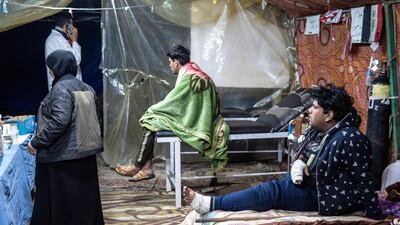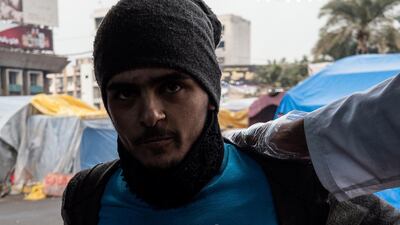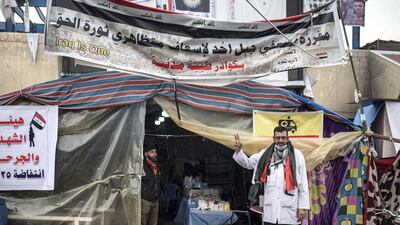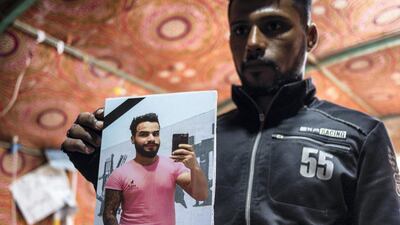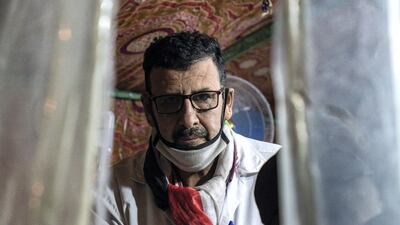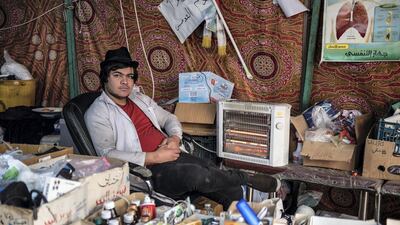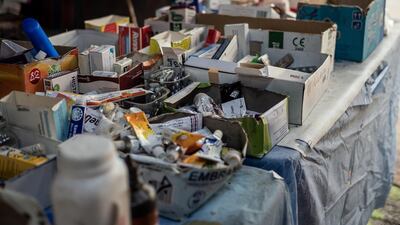In a vastly unequal society, Dr Ali Al Abadi survived crisis after crisis, rising high enough to live comfortably.
When street protests erupted in Iraq in October, they were met with a violent crackdown from the security forces. Facing everything from snipers’ bullets to tear-gas canisters, the number of dead and injured began to climb.
With protesters being wounded at an alarming rate, many flocked to Baghdad’s Tahrir Square to do whatever they could to offer support. So did Dr Al Abadi, giving up a secure family life in the southern city of Nasiriyah. His salary as a surgeon bought him the stability and comfort craved by many who took to the streets.
Speaking to The National from his ramshackle clinic, Dr Al Abadi recalls working across the world for the United Nations, naming Yemen, South Sudan and Guinea as just some of the places where he was posted.
There are few things he has not seen during a 30-year medical career in some of the most difficult circumstances the world has to offer. Now, he is dealing with a major crisis in his own country.
His clinic is a long way from the fully equipped hospital he works at in Nasiriyah. Filthy blankets rest on beds under a tarpaulin roof. When it rains, strategically positioned buckets stop the place from flooding. A long counter with countless half-empty boxes of medication is his pharmacy. He refuses to waste a single tablet or a drop of antiseptic cream – everything may come in useful at some time.
Dr Al Abadi towers above many of the others in the square, in terms of stature and age. The protest movement has largely drawn those who are young, unemployed or students. At 53, Dr Al Abadi is an elder, although he is just as angry at the government as the young people around him. “We want to reinvent the political culture – on our terms,” he says.
“This is a government that doesn’t care for its people. It’s a government that doesn’t care for peacefulness.”
The Doctor, as he is simply known around the square, often barks at his portly assistant Hisham, who occasionally has the demeanour of a grumpy schoolteacher. At the same time, he is clearly proud to be among the protesters.
With armed police and militiamen standing guard at the entrances to the city’s main hospitals, many protesters are too afraid to seek treatment there. So it has fallen to a handful of volunteers to treat not only the gunshot wounds and the effects of tear gas on protesters who return from clashes with the security forces, but to also maintain health in the tent city in Tahrir where thousands are camped.
Dr Al Abadi’s clinic, like others in the square, relies entirely on donations, from saline and syringes to the lunches that keep him going. His salary has been cut since leaving Nasiriyah and he often has to dig into his savings to buy bandages and drugs.
He is sure that he will be arrested the moment he leaves the safety of Tahrir Square.
Since leaving his job, the protest site has become Dr Al Abadi’s life. He eats, sleeps and operates in a musty tent at the foot of the Turkish Restaurant, a towering half-completed building occupied by the protesters for months, until supporters of populist Shiite cleric Moqtada Al Sadr forced them out at the weekend.
On a busy day, the doctor might see dozens of patients, from older people seeking insulin to others with life-threatening gunshot wounds. He has no idea how serious his next case might be.
Into his surgery limps Yousef, 22, a protester who has been unemployed since leaving school. “This is one of my patients,” Dr Al Abadi chuckles. The young man is filthy, with blackened hands from a long afternoon dragging the tyres that protesters set alight to block roads. Yousef lifts his shirt to reveal half a dozen stitches. “They took the bullet out right here,” he says, pointing at one of three filthy beds. Dr Al Abadi shows a video on his phone of him operating on the young man, fishing for the bullet with his instruments.
Tahrir, and squares like it in other cities, have laid bare a generational divide in Iraq. Many of the young people are bitterly disappointed that the older generation never challenged a system they believe has failed them for 17 years – they accuse them of remaining paralysed by the fear ingrained under Saddam Hussein, the dictator toppled in 2003.
Many of their parents, uncles and aunts largely support the idea of change but are petrified by the protests. Many of those in the square are forced to lie, protesting while they should be at work or in college.
As Abdullah Al Jasim, 22, a student, says: “My real enemy is my family, because they don’t believe what I believe. I’ve got the internet, I can travel. They didn’t have those things when they were growing up.”
Dr Al Abadi admits disappointment, even embarrassment, at the fact that more people like him did not make a stand sooner. But now, he’s all in.
“The youth have come out of a womb of suffering. But they insist on creating a new, generous country, with new possibilities and a new history,” he says. “I am not young, but I am supporting them. They are the cornerstone of this revolution”.
There are some who he was unable to help. At the back of his tent hangs a poster of Sajad Salman Ali.
“This is a true Iraqi,” he says, pointing to the portrait of the fresh-faced 16-year-old.
“They aimed at his head”.
He no longer has the energy to fight back tears. Instead, he allows the emotion to pour out, whenever it comes.
